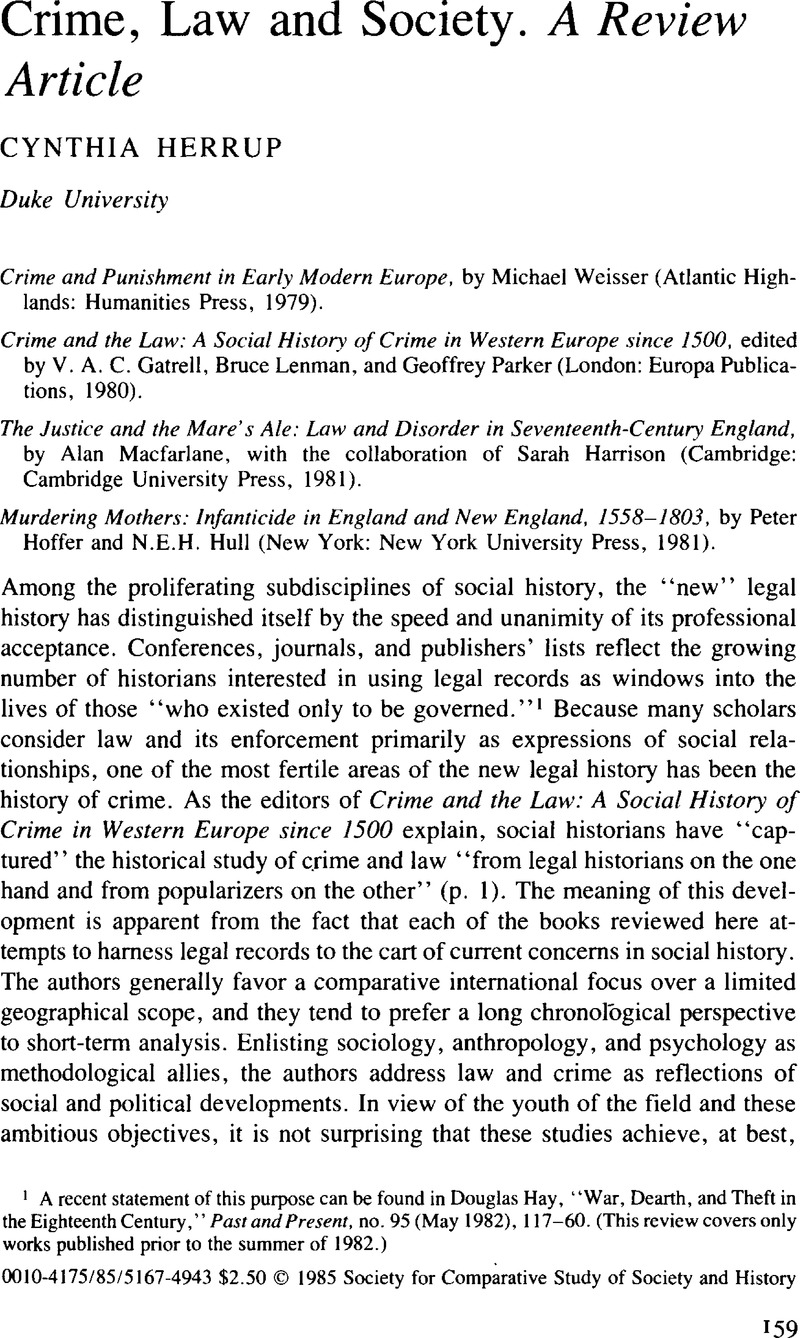Article contents
Crime, Law and Society. A Review Article
Published online by Cambridge University Press: 03 June 2009
Abstract

- Type
- Deviance and Social Control
- Information
- Copyright
- Copyright © Society for the Comparative Study of Society and History 1985
References
1 A recent statement of this purpose can be found in Hay, Douglas, “War, Dearth, and Theft in the Eighteenth Century,” Past and Present, no. 95 (05 1982), 117–60. (This review covers only works published prior to the summer of 1982.)CrossRefGoogle Scholar
2 Weisser's is the second contribution published in the series “Pre-Industrial Europe, 1350–1850,” Humanities Press. The general editor is Geoffrey Parker. The other available book, Poverty and Capitalism in Pre -Industrial Europe, was written by Catharina Lis and Hugo Soly. It is a more careful and a more useful effort than its successor.
3 Tombs and Lamer have both published fuller investigations of their topics since 1980; see Tombs, Robert, The War against Paris, 1871 (Cambridge: Cambridge University Press, 1981)Google Scholar, and Lamer, Christina, Enemies of God: The Witchhunt in Scotland (Baltimore: Johns Hopkins Press, 1981).Google Scholar
4 But see Shubert, Adrian, 'Private Initiative in Law Enforcement: Associations for the Prosecutions of Felons, 1744–1856,” in Policing and Punishment in Nineteenth-Century Britain, Bailey, Victor, ed. (London: Croom Helm, 1981), 25–42, for the view that provincial satisfaction with amateur enforcement has been exaggerated.Google Scholar
5 However, for a perceptive critique of Davis, see Bartrip, Peter W. J., “Public Opinion and Law Enforcement: The Ticket-of-Leave Scares in Mid-Victorian Britain,” in Policing and Punishment, Bailey, , ed., 150–83, esp. 174–77.Google Scholar
6 See Gatrell, V.A.C. and Hadden, T. B., “Nineteenth-Century Criminal Statistics and Their Interpretation” in Nineteenth-Century Society: Essays in the Use of Quantitative Methods for the Study of Social Data, Wrigley, E. A., ed. (Cambridge: Cambridge University Press, 1972), 336–96;CrossRefGoogle ScholarBeattie, John, “Towards a Study of Crime in Eighteenth-Century England: A Note on Indictments,” in The Triumph of Culture: Eighteenth-Century Perspectives, Fritz, Paul and Williams, David, eds. (Toronto: A. M. Hakkert, 1972), 299–314;Google Scholar and “The Pattern of Crime in England, 1660–1800,” Past and Present, no. 62 (1974), 47–95.Google Scholar
7 For examples other than those already mentioned, see Crimes et criminalité en France sous l' ancien régime, Abbiateci, A., ed. (Paris: Cahiers des Annales, 1971);Google ScholarAlbion's Fatal Tree: Crime and Society in Eighteenth-Century England, Hay, D., Linebaugh, P., Rule, J. G., Thompson, E. P. and Winslow, C., eds. (New York: Pantheon, 1976);Google ScholarCrime in England, 1550–1800, Cockburn, J. S., ed. (Princeton: Princeton University Press, 1977);Google ScholarAn Ungovernable People? The English and Their Law in the Seventeenth and Eighteenth Centuries, Brewer, John and Styles, John, eds. (New Brunswick: Rutgers University Press, 1980)Google Scholar; Law and Human Relations (London: Past and Present Society, 1980)Google Scholar; Crime and Criminal Justice in Europe and Canada, Knafla, L. A., ed. (Atlantic Highlands: Humanities Press, 1981).Google Scholar
8 Christina Lamer and Jennifer Davis are exceptions to this criticism, as, from the broader perspective of his other work, is J. A. Sharpe.
9 In addition to the published works cited above, see Curtis, T. C., “Some Aspects of the History of Crime in Seventeenth-Century England, with Special Reference to Cheshire and Middlesex” (Ph.D. diss., Manchester University, 1973);Google ScholarSharpe, J. A., “Crime in the County of Essex, 1620–1680: A Study of Offences and Offenders at the Assizes and the Quarter Sessions” (D.Phil. diss., Oxford University, 1978);Google ScholarHerrup, Cynthia, “The Common Peace: Legal Structure and Legal Substance in East Sussex, 1594–1640” (Ph.D. diss., Northwestern University, 1982).Google Scholar
10 Macfarlane, Alan, The Origins of English Individualism (Oxford: Basil Blackwell, 1978).Google Scholar
11 A more perceptive approach to Macfarlane's objection to the current historiography on early modern violence is Sharpe, J. A., “Domestic Homicide in Early Modern England,” Historical Journal, 24:1 (1981), 29–48.CrossRefGoogle Scholar
12 'Crime and the Historian,” in Crime in England, Cockburn, , ed., 1.Google Scholar
- 4
- Cited by


